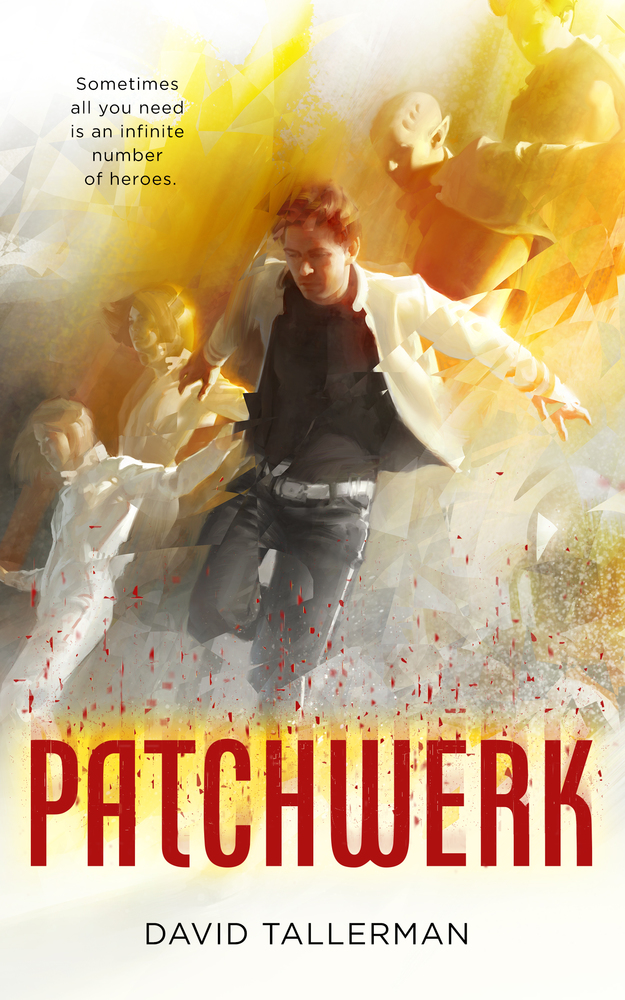This is what science fiction writing should be. Having fun with outlandish ideas while keeping the prose simple and elegant. My love of SFF writing was born from reading Ursula Le Guin and Tallerman’s new novella follows in her daunting footsteps admirably.
 The complex and outlandish premise for Patchwerk works well in novella form. Long enough to be meaty, but short enough not to be taxing for the reader. It fits in well with Tor.com’s imprint. Tor.com has been publishing some excellent genre work since they launched the new imprint, including short works by Nnedi Okorafor, Angela Slatter, and Daniel Polansky. Short fiction has been floundering in recent decades after SFF began in pulp magazines and the like. With Tor.com’s excellent short stories and now the novella imprint, I’m looking forward to a rejuvenation of the short form SFF story.
The complex and outlandish premise for Patchwerk works well in novella form. Long enough to be meaty, but short enough not to be taxing for the reader. It fits in well with Tor.com’s imprint. Tor.com has been publishing some excellent genre work since they launched the new imprint, including short works by Nnedi Okorafor, Angela Slatter, and Daniel Polansky. Short fiction has been floundering in recent decades after SFF began in pulp magazines and the like. With Tor.com’s excellent short stories and now the novella imprint, I’m looking forward to a rejuvenation of the short form SFF story.
‘He had been mired for so long in theory, with no thought of application.’
Patchwerk is a difficult novella to talk about. I want to excitedly tell you why you should read this book but most of what I really loved about the novella is intensely spoilerific. Even the basic premise is tricky to illuminate without giving the game away. Here is my attempt at a short and snappy pitch for Patchwerk (without really telling you anything!):
Dran Floranov has built a machine. On his way to a safe haven, he is caught and held hostage by his ex-wife and her new lover, Dorric, a scientist with no moral compass and a terrifying desire to cause mass destruction. The machine is malfunctioning in unpredictable and unforeseen ways. Can Dran get past Dorric, save his machine – and the world – in time?
Tallerman’s novella does exactly what science fiction – in my opinion – should do. And that’s have fun with a cool idea. Why else do we write and read SF? If we wanted something realistic or a narrative to fall within the current realm of existence, we’d bore ourselves with the latest snore-inducing Man Booker Prize winner. The idea at the novella’s core is both complex and simple – difficult to grasp and yet so obvious as to be inevitable. Perhaps that’s what makes Patchwerk special – the exceptional execution makes the convoluted premise work.
‘Floranov had always tended to forget what an omnivore of knowledge she could be.’
With wonderful description and utterly readable prose, Tallerman never devolves into a flowery or OTT scientific jargon. Instead, the entire piece is fluid, sliding the reader through the complex structure and premise as though it were the most natural course for the story to take. I first noticed this easy fluidity early on when the reader is delicately transferred into a flashback. It is seamless while managing to stay clear and transparent. Then, when the main meat of the story kicks in (and the narrative grows into an elaborate stack of dominoes, precariously piled – though never toppling!), the reader is pulled along by the action, the elegant prose, and is never once tripped up by maze-like plot.
 While the prose is never in your face (just how I like it), Tallerman isn’t afraid to have fun with language. There are some brilliant descriptions that brought a smile to my face. Possibly my favourite moment in the novella is when the main character uses a ‘hanging sentence’ to put the thugs off guard: ‘And as good as Dorric’s men were, they hadn’t had his psych training; they were no match for a hanging sentence.’ It’s this balance of un-intrusive yet playful prose that makes Patchwerk such a joy to read.
While the prose is never in your face (just how I like it), Tallerman isn’t afraid to have fun with language. There are some brilliant descriptions that brought a smile to my face. Possibly my favourite moment in the novella is when the main character uses a ‘hanging sentence’ to put the thugs off guard: ‘And as good as Dorric’s men were, they hadn’t had his psych training; they were no match for a hanging sentence.’ It’s this balance of un-intrusive yet playful prose that makes Patchwerk such a joy to read.
‘He couldn’t heal the world, but perhaps he could still bandage its wounds.’
In many ways, Patchwerk is a traditional SF story: an invented future where technology can help solve all our problems, but as usual, someone wants to twist the intention and turn something beautiful into a weapon. I am all for this throwback to traditional SF – these are the kinds of stories that made me fall in love with the genre. And there are still so many untold stories that can fit this style of storytelling. Unlike many pessimistic SF stories, Patchwerk is ultimately hopeful while acknowledging the darker side of technological innovation. But with progress comes risk and when one person has invented something, another will manage it in due course.
Verdict: Great Science fiction novella worthy of the SF canon. Action packed and fast paced while never managing to become unintelligible despite the complex plot/concepts involved.
 Pop Verse Pop Culture Universe
Pop Verse Pop Culture Universe







